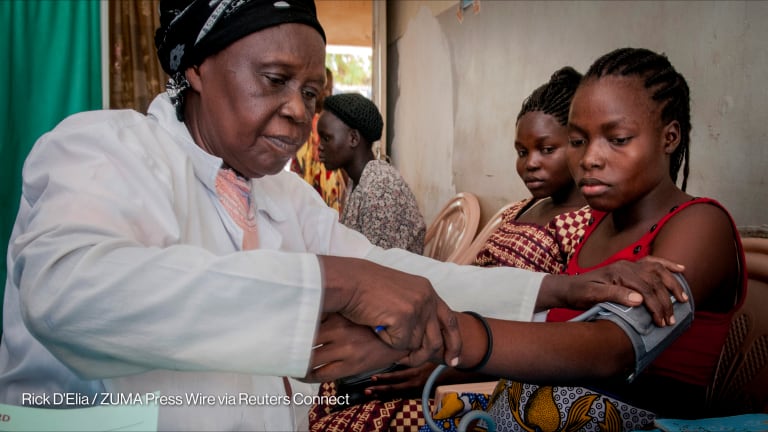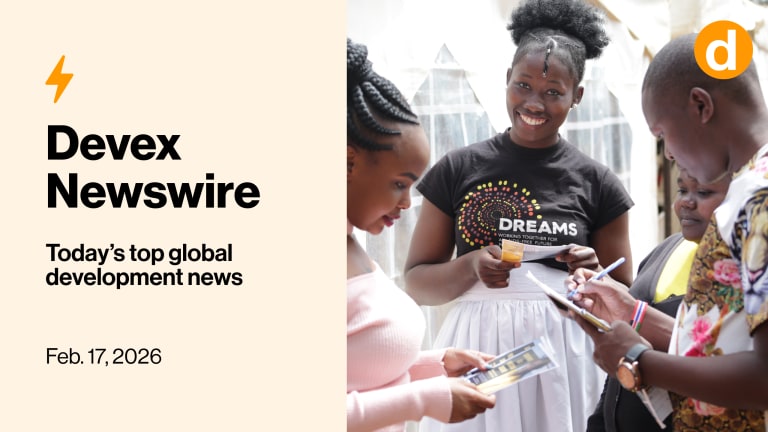What happens when you invest in girls and women? It's simple: We all win

As the third International Conference on Financing for Development in Addis Ababa, Ethiopia, draws to a close, questions about how we will fund the sustainable development agenda and broader global development are being debated.
Like any negotiation process, policymakers must make tough decisions to maximize limited resources. However, one issue policymakers cannot afford to compromise on is the health, rights and well-being of girls and women.
Girls in sport: A powerful game changer for the SDGs
Sport programs need to be incorporated into strategies to improve the health and well-being of women and girls, to address gender inequality and to help cultivate the skills of tomorrow's leaders in politics and the marketplace, Women Deliver's Katja Iversen and Women Win's Maria Bobenrieth write in this guest commentary.
We know that investing in girls and women, particularly their sexual and reproductive health and rights, education, and economic empowerment, is among the smartest ways to advance progress for all. Evidence shows that when girls and women can plan their families and avoid early pregnancy, they are more likely to finish school, raise healthy families and contribute to their communities and economies. In other words, everybody wins.
As decision-makers finalize the painstaking negotiations this week, here are three investments they should fight for to propel development for the next 15 years and beyond:
1. Earmark official development assistance for girls and women.
ODA remains a critical source of income for many countries, particularly the least developed. Now is the time for members of the Organization for Economic Cooperation and Development to keep a long-standing promise to spend 0.7 percent of gross national income on development aid, with earmarked gender-focused spending to make sure that gender equality remains a global priority. Similarly, donors must fulfill commitments already made to girls and women — more than 20 years ago — in landmark agreements such as the Cairo Program of Action and Beijing Platform of Action.
2. Require domestic budgets to include and properly fund line items for girls’ and women’s health, rights and well-being.
Domestic financing will be an increasingly important part of closing the funding gap — and as countries become less dependent on foreign aid, prioritizing gender equality in domestic resource spending will be more important than ever. This means creating government budgets that are transparent, participatory and gender responsive.
As the phrase goes: “What gets counted, gets funded.” On a national level, countries must be able to collect and report gender and age-disaggregated data to track progress and allocate resources efficiently. This will be essential to make sure that no one gets left behind.
3. Form partnerships that include girls and women, for girls and women.
An agenda as ambitious as the sustainable development goals — and broader development generally — can only be achieved through alliances among governments, civil society and the private sector. The disparate interests and strengths of these groups must be seen as complementary, not competing.
For example, the private sector has considerable financial and technical resources that are currently underleveraged. What is more, they should look more critically at workplace guidelines and practices to help foster decent and fair working environments. By engaging private sector partners, we can help level the field for women by mandating fair labor practices that increase access to essential resources, such as water, sanitation, financial protection and health services, including sexual and reproductive health services.
At the same time, negotiators must realize and fund the vital role that civil society organizations play. For one, civil society groups are the watchdogs of development: They hold global and national governments and private sector entities accountable to their commitments. They can also bridge the gaps between the private sector and government vis-à-vis their role as program implementers.
A promising example of multisector investment and collaboration is the Global Financing Facility, a funding platform launched this week in Addis Ababa in support of the U.N. secretary-general’s Global Strategy for Women’s, Children’s and Adolescents’ Health, led by “Every Woman Every Child.” Under the GFF, $12 billion in domestic and international, and private and public funding was announced and aligned to country-led five-year investment plans for women’s, children’s and adolescents’ health, thanks to an impressive partnership between the World Bank; the governments of Norway, Canada, the United States, Ethiopia, Tanzania and Kenya; the Bill & Melinda Foundation; private sector entities; and many other partners. This is the type of collaboration we need across development if substantial and lasting progress is our goal.
We have our work cut out for us, but if we rally behind these core principles and commit to prioritizing girls and women, we can — and will — achieve transformative change.
Devex is in Addis to give you the inside track on #Fin4Dev. Check out our running blog, and follow @Devex, @richard_devex and @AlterIgoe to get the latest news and developments from #FFD3.
Search for articles
Most Read
- 1
- 2
- 3
- 4
- 5








